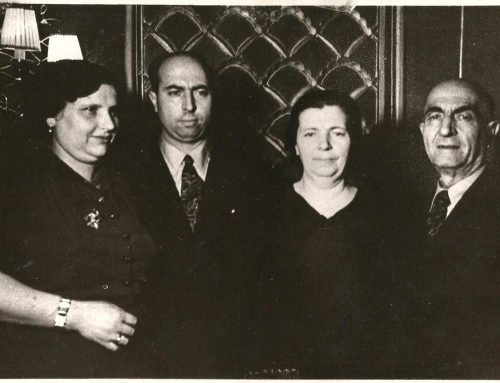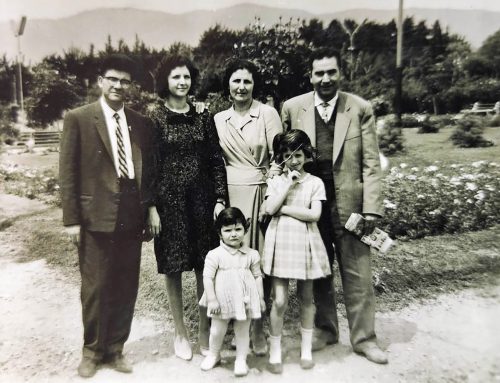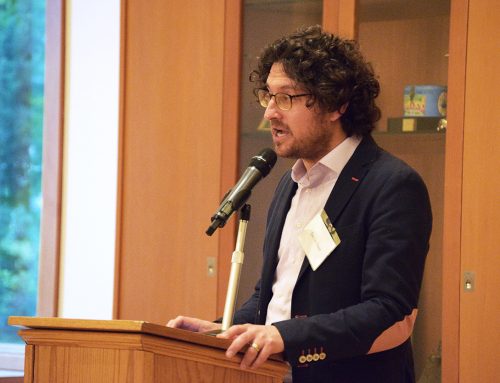
Dr. Rina Benmayor, Professor Emerita of Oral History, Latina/o Studies, & Literature
By Dr. Rina Benmayor
The Benmayor Collection of Eastern Sephardic Ballads and Other Lore is a collection of over 140 audio recordings gathered by Dr. Rina Benmayor in Seattle and Los Angeles during the 1970s. In conjunction with her visit to the University of Washington in 2014, and working together with the Sephardic Studies Program and Stroum Center for Jewish Studies, Dr. Benmayor organized, catalogued, and digitized her recordings and kindly contributed them to the Sephardic Studies Digital Collection.
For 42 years, my cassettes of Sephardic elders singing medieval Spanish ballads, or romances, sat in a shoebox. They traveled with me from Seattle and Los Angeles to Berkeley to New York and back to California. Now, thanks to the Sephardic Studies Digital Library and Museum, the Stroum Center for Jewish Studies, and the University of Washington Library and Archives, the voices that were encased for so long will once again be heard. I am immensely excited and gratified that at long last, these ballads can return to the communities from whence they came and be disseminated across the globe.
In 1972 and 1973, I traveled to the Sephardic communities of Los Angeles and Seattle to collect these precious medieval Spanish ballads, preserved in family oral traditions for over 500 years. My visits became occasions for family memory, as these lovely and generous elders sang the songs they learned in childhood from their parents and grandparents in Turkey or Greece. This field collection became the basis for my doctoral dissertation, and was eventually published in Spain. Romances judeo-españoles de Oriente: Nueva recolección (Eastern Judeo Spanish Ballads: A New Collection) made available the poetry and musical transcriptions of the almost 150 ballad texts I was able to collect. Yet, the book was written in Spanish and while largely known to Romancero scholars, it did not circulate among Sephardic communities. With their digitization and online dissemination as part of the Sephardic Studies Collection, these romansas can finally be heard in their original oral/aural form.

Seattle Sephardi community members Estrea Chiprut and Matilda Barkey, photographed as part of Rina Benmayor’s fieldwork in Seattle
Sephardic romances/romansas have a long and rich trajectory from the villages and cities of medieval Spain into exile in the Ottoman Empire. There they flourished thanks to a system that granted cultural, social, and educational autonomy to ethnic communities. In the final leg of their journey –to America–, they became virtually extinct. The cultural and community practices that kept these ballads alive for centuries are now a thing of the past, making collections like this one a last vestige of the Sephardic ballad oral tradition.
The romansas in this collection retain the medieval romance form: a dramatic story sung in eight-syllable verse with ‘assonant’ (vowel) rhyme. The themes include historical events, tales of kings and queens, reunited lovers or unrequited love, murders, absences and returns, trickery, and social taboos. Each of these ballads can be traced back to its medieval origins, but the Sephardim gave their versions special twists, making them relevant to their lives in exile. For example, the murder of the Duque de Gandía, brother of the infamous Caesar Borgia, is remembered in faithful historical detail, but more as a lament at the loss of a son. In some versions of Tarquino y Lucrecia, a classical tale of Roman origins, the adulterous queen prefers to die by the sword than to sleep with a Christian! In The Idolater of María, the Christian captain of a storm-tossed ship drowns because he invokes the Virgin Mary, while the Jewish crew prays to el Dio Alto, and is saved! The collection also includes uniquely Sephardic creations like El Paso del Mar Rojo (Crossing the Red Sea), which recounts the story of the Exodus.
“La Muerte del Duque de Gandía” (The Death of the Duke of Gandía)
An historical ballad that tells the story of the death in 1497 of Juan Borja (son of Pope Alexander VI), murdered by his brother Caesar Borgia.
This collection holds interest for students of Sephardic culture, Spanish culture, folklore, oriental music, Ladino language learners, and of course, for the singers’ descendants and Sephardic communities overall. The collection provides a vivid example of the dual forces of cultural preservation and change in diasporic communities. It attests to the importance of respecting cultural self-determination and the dangers of full assimilation. Ballads are carriers of language and in this regard can provide Ladino learners with new texts that may inspire, along with the study of language, a resurgence of the Sephardic romansero!
The ballads recorded in Seattle launch this online collection. Later, the Los Angeles recordings will be added. Many of the ballads tell entire stories from beginning to end. Others are mere fragments, what people could remember at the time of the recording. Most had not heard or sung these ballads in years and their performances were unrehearsed, as they would have been when they were sung at home to put children to sleep, while working, or in community gatherings. Included in this ballad collection listeners will also find a few lyric love songs, several folktales, and some descriptions of folk cures.
—Visit the Benmayor Collection of Sephardic Ballads, part of the digital Sephardic Studies Collection—
Rina Benmayor is Professor Emerita of Oral History, Latina/o Studies, and Literature at CSU Monterey Bay, and is author of the books Romances judeo-españoles de Oriente : nueva recolección and co-editor of Migration & Identity, Telling to Live: Latina Feminist Testimonios, and Memory, Subjectivities, and Representation: Approaches to Oral History in Latin America, Portugal, and Spain. She received her Ph.D in Romance Languages & Literatures from UC Berkeley.
This project was generously supported by an Ignition Grant from the Jewish Federation of Greater Seattle.
For Further Exploration
- Sephardic Ballads Collection Highlights by Rina Benmayor
- The Faces and Voices of Sephardic Music in Seattle, profile of Rina Benmayor’s research by Ty Alhadeff (Mar. 2014)







Leave A Comment